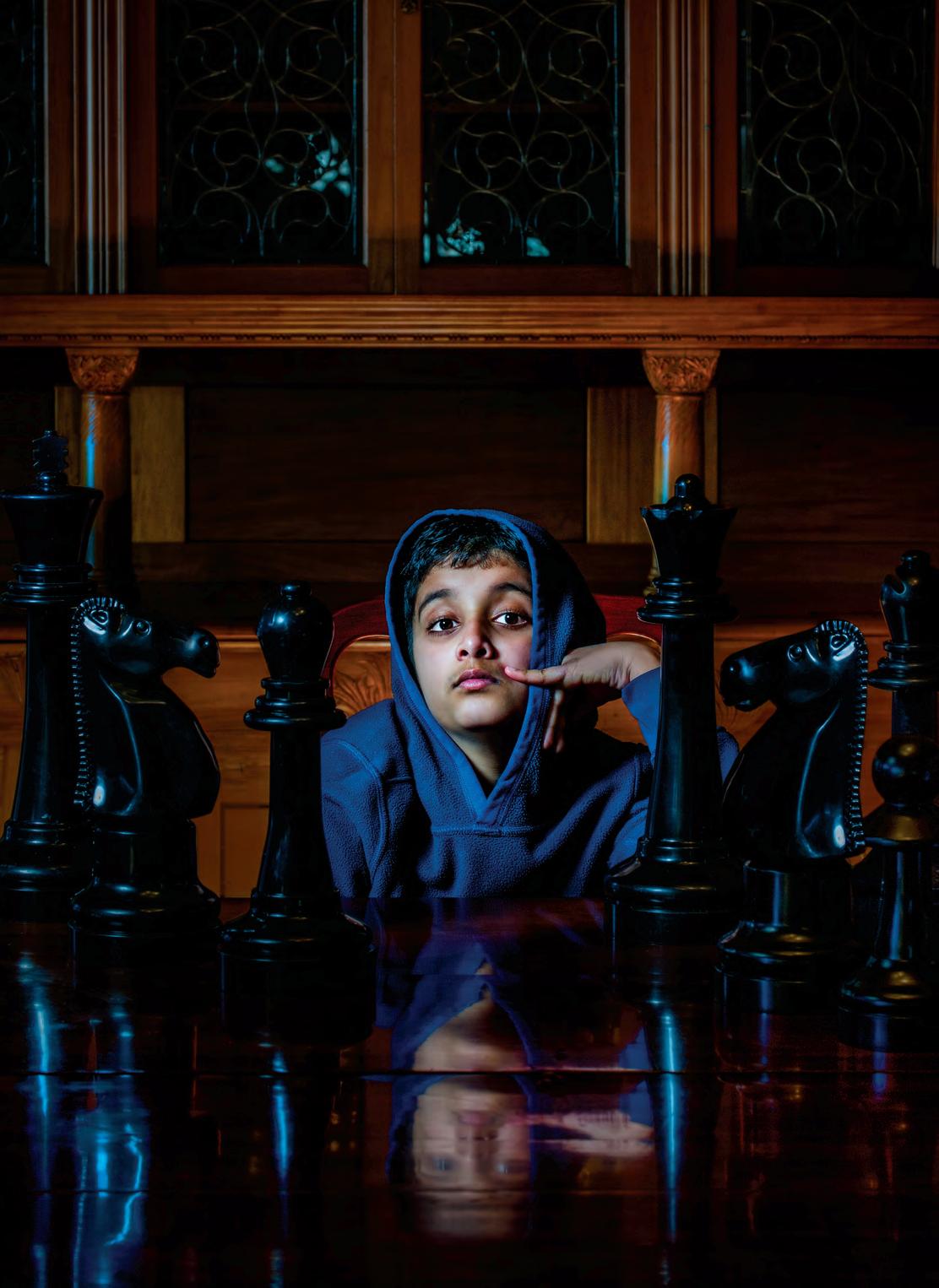
3 minute read
Transcript
Chess Whız
PHOTO AND INTERVIEW BY DAVID MENDELSOHN
He’s consumed with everything Marvel, loves dogs and his mom’s cooking. He is also chess whiz, a prodigy, weighing in at a mere 80 pounds and having just turned 11. Meet Hrishi Vedula of Brentwood, a nationally ranked player who has been pushing his pawns around since the age of 4 and started racking up tournament points while still in kindergarten. He is endowed with exceptional abilities yet is still a child, playing gaga ball with his fifth-grade friends and watching Spiderman save the world. Hrishi, unswayed by all the adult attention, remains a grounded boy and a seriously great kid.
My parents say I started when I was 4 ½ years old, but I’ve been playing chess for as long as I can remember. I just had my 11th birthday. I am studying fifth grade in the best school of New Hampshire, Swasey Central School in Brentwood. Math is my favorite subject. I like puzzles and love working with cool numbers.
When I first started playing chess, competing for me was nerve-wracking, but as I played more, it wasn’t as scary. White always goes first. Usually, a person who plays white has a small advantage of how to drive the game’s strategy. In tournaments, the tournament director decides who gets white and black for the first round. Subsequent rounds will usually have the colors alternating. The objective in chess is to checkmate (to capture) the opponent’s king. If I am playing white, I start with one of several chess openings that evolves depending on what tactics my opponent uses against me. It is full of strategy. I can visualize playing the moves and being on the board leading a team of fierce, brave warriors. Every game is so unique — it is its own universe of pawns, rooks, knights, bishops and a queen working hard to win for their king. It’s like each game is a multiverse of unexpected events. A great chess player can always find a way to win against their opponents, no matter how difficult the position is. They also have their own personal style of playing. Finally, they grow from mistakes made in their games, and keep cool even if they lose. Having a poker face is important because it will hide your emotions — decreasing your opponent’s confidence. Your opponents won’t be able to read your strategy from your facial expression. To become a great player, I recommend practicing chess puzzles, reading lots of chess books and analyzing games. I want to be a pro chess player one day and represent the U.S.A. in international tournaments. My dream is to play with Magnus Carlsen , who is the current world champion. I hope I will make my dream come true. Alireza Firouzja and Magnus Carlsen are my heroes. Firouzja is the youngest player to cross a rating of 2800. Carlsen has the highest rating ever recorded. No, I haven’t seen the “Queen’s Gambit,” but my parents have. I’m not allowed to watch it yet.


A Successful Covid Gambit
Chess is commonly played across a span that’s about half of the distance we were all expected to remain from one another during the past two pandemic years. John Elmore, president of the New Hampshire Chess Association, says Covid had two effects on chess. “The first was negative, as over-the-board (OTB) chess events could not go forward due to restrictions on indoor gatherings,” he says. Regular events were curtailed, which hurt tournament attendance. “Fortunately,” he adds, “Covid coincided with ‘The Queen’s Gambit,’ creating a second effect that appears to have been positive. There were many people who, unable to go out and pursue entertainment, picked up online chess as a hobby during the pandemic. Many players, inspired by the Netflix series, have turned a year of working on their games online into a foray into the world of OTB chess. Indeed, we have seen that, as tournaments have resumed, we are seeing healthy turnouts at adult events.” Special thanks to Holly Gibson and Steve Martin for the use of the Kimball House at the Capitol Center for the Arts, John Elmore for arranging this interview, and Satya Vedula (dad) Jyotsna (mom) and Pranavi (sister) for all of the support regarding Hrishi.










